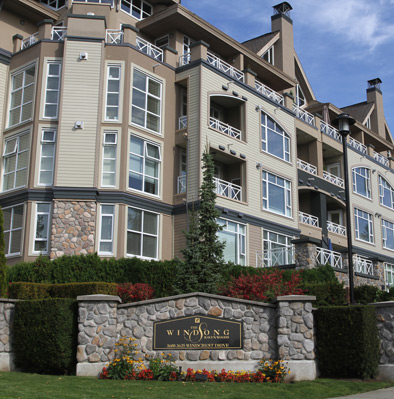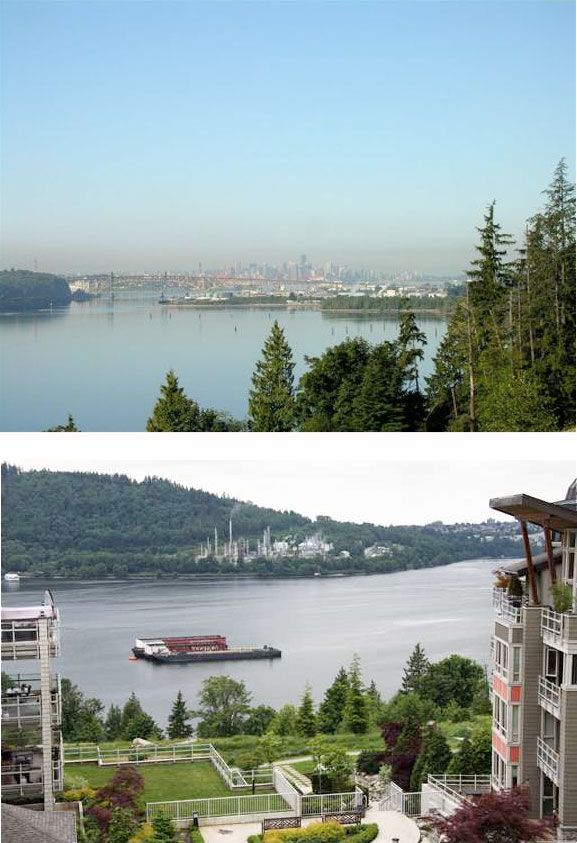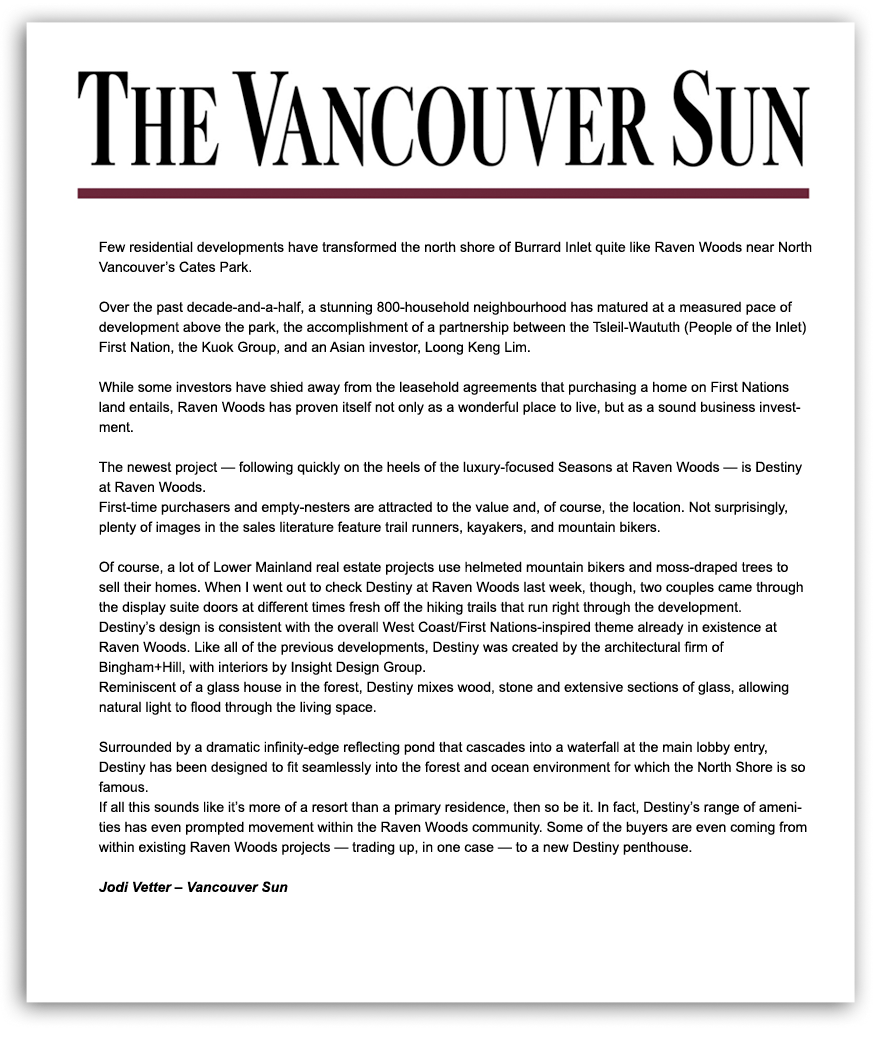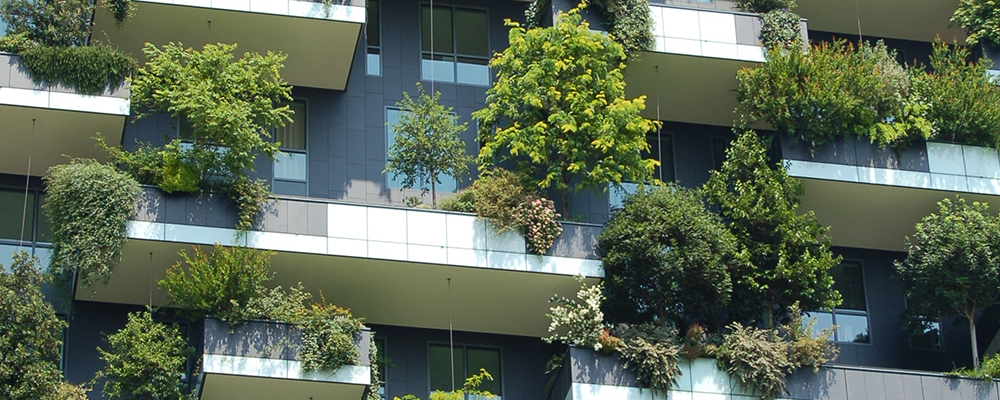Leasehold Ownership
 While there are a variety of housing ownership interests, the most common include the following:
While there are a variety of housing ownership interests, the most common include the following:
Freehold – A freehold interest (also known as a fee simple) is the more precise term for what we ordinarily refer to as “ownership” of a home. The owner of the freehold interest has full use and control of the land and the buildings on it, subject to any rights of the Crown, local land-use bylaws, and any other restrictions in place at the time of purchase.
Strata Title – The strata title form of ownership is designed to provide exclusive use and ownership of a specific housing unit (the strata lot) which is contained in a larger property (the strata project), plus shared use and ownership of the common areas such as halls, grounds, garages, elevators, etc. This type of ownership is used for duplexes, apartment blocks, townhouse complexes, warehouses, and many other types of buildings. In additiion, some single family home developments may be part of a bare-land strata development. Because ownership of the common space is shared, the owners also share financial responsibility for its maintenance.
Leasehold – In some cases, you might purchase the right to use a residential property for a long, but limited, period of time. The owner of this right of use has a type of ownership called a leasehold interest. This type of ownership is used most often for townhouses or apartments built on city-owned land. It is also used occasionally for single detached homes on farm land, on First Nation reserves, and for apartments where the owner of the freehold interest of an entire apartment block sells leasehold interests in individual apartment units to other “owners.” Leasehold interests are frequently set for periods of 99 years, but regardless of the length of the original term, you will only be able to purchase the remaining portion. Of course,the shorter the remaining portion, the less you, or the person who eventually purchases from you, will be willing to pay for the leasehold interest.
Cooperative – In the cooperative form of ownership, each owner owns a share in a company or cooperative association which, in turn, owns a property containing a number of housing units. Each shareholder is assigned one particular unit in which to reside.
Raven Woods
Raven Woods is a Leasehold development located on the land of Tsleil-Waututh First Nation in the Roche Point area of North Vancouver.
The development consists of the following condominiums and townhouses
Seasons South – 86 homes (2006 Georgie Awards Finalist)
Seasons West – 85 homes
Seasons (phase I) – 94 homes
Deerfield by the Sea – 131 homes
Deerfield – 84 homes
Windsong III – 50 homes
Windsong I and II – 131 homes
The Legend – 74 homes
The Raven Woods Townhomes – 64 homes
Destiny – Scheduled Completion Summer 2012
The Signature Estates – Duplex Style Townhomes


I UNDERSTAND THAT I AM “BUYING” A 99 YEAR LEASE ON INDIGENOUS RESERVE LAND OWNED BY THE CROWN – can you explain what that means to me?
Leased lands are located on a Reserve, which is owned by Her Majesty the Queen, in Right of Canada. The land has been set aside as Reserve Land under the Indian Act of Canada.
Certain band members (called “Locatees”) had possession of these lands and requested that the Federal Government enter into 99 year leases with Developers, for the benefit of the various Locatees. Essentially, the band member agreed to suspend his or her use and occupation of the land for the 99 year period of the lease in return for payment of the prepaid rent for the term of the lease. Each lease is a direct contractual agreement between the Federal Government and the developer and there are no other parties to the lease.
Each developer’s lease is described as a “Headlease”, since it allows subdivision of the lands and the issuance of subsidiary leases, or “Subleases” to people who would like to purchase the property. Your interest will be as holder of a Sublease from the developer to yourselves, which, subject to the terms of the Headlease and Sublease, will entitle you to the use and occupation of the premises for the remainder of the original 99 year lease, less one day. So long as you pay your rent, common costs and property taxes, and the terms of the Headlease and Sublease are properly fulfilled by all parties, you will be entitled to the use of the property in the same manner as if you owned a home built on freehold property.
Since this is a leasehold situation, the terms we usually use to describe a land transaction are misleading. While you can “Buy” from the developer, you are actually acquiring a “Sublease” and when you “Resell” your home you will be “Assigning” your Sublease. While you can “Own” the leasehold interest, you cannot the “Own” the land, since it will continue to be owned by the Crown, subject to the Headlease and subleases.
WHAT EFFECT WILL SELF GOVERNMENT HAVE ON MY LEASEHOLD INTEREST?
The self government process will not affect your leases in any way. One of the most basic building blocks of the self government process was to set out clearly in each document that the rights of non natives on reserve are to be protected at all times. The various documents used to establish the Native Leased Land all state clearly that the rights of non natives are protected. Actual title to the lands remains in the Crown. The Native Band takes over management of the lands for their own benefit but all leases will continue in accordance with their terms. The Band simply replaces the Federal Government as the nominal lessor with respect to all existing leases, and will be the signatory for all new leases.
One major benefit to the Self government for non natives is the legal requirement for an advisory council. This now enshrines in law the voluntary advisory council and gives it specific legal authority to represent the concerns of non native living on reserve.
I’M TOLD THAT THE HEAD LEASE IS A FULLY PREPAID LEASE? – What does that mean?
A prepaid lease is simply a lease that has had all rent paid fully in advance instead of paying the rent monthly or annually. Those Headleases where all lease payments are paid in advance are said to be “Fully Prepaid” for the full 99 years. As purchaser’s, we want to know that the developer has already paid the full rent and all other expenses for the same period of time that he expects us to prepay.
Some projects have fully prepaid Headleases for the whole of the proposed development, while others prepay each phase before proceeding. This can only be determined by reviewing the Headlease.
WHAT ARE THE TERMS OF THE HEADLEASE?
The Headlease entered into by the developer with the Federal Government is the primary document giving the developer and the Sublessees the use of the land. Each development has a slightly different Headlease. The Headlease contains many requirements relating to preliminary matters that have already been fully completed, which we will not address here. (Please consult the specific Headlease for full details). The most important continuing obligations of the Developer under the Headlease are to pay the rent on undeveloped lands within the lease area, (if it has not been fully prepaid), to pay the taxes and to maintain the property. Each of these continuing obligations (with the exception of the Headlease rent) has been passed on to the individual Sublessees in their subleases.
WHAT ARE THE TERMS OF MY SUBLEASE?
Your Sublease gives you the right to the use and occupation of the premises for the remainder of the 99 years and creates some obligations that must be honoured. The following are some of the highlights of the sublease that you will be asked to sign. They are very similar to living in a free hold strata but please consult the Sublease for actual wording.
1. The sublease is for the remainder of the original Headlease, less one day.
2. The Rent is either fully or partially prepaid at closing.
3. You must pay your share of common costs, which, like strata fees, are paid monthly, based on a proposed budget, and any
variation in actual costs is made up at the end of each year, again much like a strata.
4. You are responsible for the repairs to your premises, but in most communities, will have any such repairs done for you by the Sublessee’s association at your expense. Think of the Sublessee’s association as a Strata Council.
5. A number of services are provided to you as part of your common costs. These vary widely depending upon the Development. Some of the major items typically include upkeep of common areas, insurance on the structure (but not the contents) of your home, water service, garbage removal, street lighting, property manager and administration.
6. In some communities, where the Developer is still managing the project, if more than 50% of the Sublessees are dissatisfied with the way the developer is managing the common areas and services, and the situation is not corrected after notice, then
the Sublessee’s Association can take over the management of the common areas.
7. You will pay for all utilities supplied to the premises and will pay your fair share if separate bills are not rendered.
8. You must pay your land rent and common area charges when due.
9. You must pay your annual property taxes when due.
I’VE HEARD SOME THINGS ABOUT LEASING ON INDIGENOUS LAND – Can the Aboriginal people take my home away, include it in a land claim or raise the rent unfairly?
Since this land is already part of an Indigenous reserve, it is not involved in any lands claims and will not be affected by any land claims settlements.
While there have been some serious situations that have arisen in other areas, we are of the opinion that the flaws in the lease arrangements that created those problems should be revealed by a lawyer reviewing the Headlease. Most of the problems have arisen where a developer has purported to sublease lands to individuals for a long term, but has not prepaid his Headlease for the same period of time.
I UNDERSTAND THAT SOME FIRST NATION LEVIES THE PROPERTY TAXES ON THIS LAND – What if they decide to increase the taxes?
In the process of establishing “Self Government” for the various First Nations, certain controls on both the assessment and the mil rate were established. The Band taxing authority must use the same guidelines and methods of assessment as the B.C. Assessment Authority now uses for regular land. The assessments must be consistent with assessments for similar homes in surrounding areas. In fact, some Bands actually contract with the B.C. Assessment Authority to do the assessments for them, so the same assessor who assesses properties in the local area also assesses these homes. With respect to the mil rate, which is the taxation factor applied to the assessed value to get the tax bill, the Federal Government must approve the mil rate each year and it must be consistent with the mil rates charged by surrounding areas for similar services to those provided to this area.
CAN I RESELL MY HOME IF I WANT?
You have right to “resell” your home at any time, by “assigning” your subleasehold interest in the land. All assignments require the consent of the developer, the Westbank First Nation and the Federal Government, which is not to be unreasonably withheld.
CAN I MORTGAGE MY INTEREST IN THE LAND?
You have the right to mortgage or assign your interest in the sublease at any time. CMHC will insure mortgages in most of the newer projects and many local banks have packages to meet your needs.
I’M STILL CONCERNED ABOUT BEING ON LEASED INDIGENOUS LAND – Where can I get more information?
There are many other valid questions with equally valid answers that simply cannot be covered in what is intended to be a short paper. If you would like to discuss any aspect of your leasehold transaction before proceeding, please feel free to contact Bob Bassett in our office. We are pleased to offer a short informational interview to any prospective buyer at no charge and have an attractive all inclusive package price for our conveyancing work. All of us at Bassett Spagnuolo look forward to meeting you and assisting you with your transaction.
This paper is intended to provide general information only, in order to answer some of the more common questions that arise in dealing with First Nations Lands. We have found that for every question we answer, another one is often raised. This paper is not to be relied upon as legal advice. As each developer has a different lease this paper must be fairly general. For a more complete dialogue, please contact Bob Bassett.
The Spagnuolo Group of Real Estate Law Firms – Copyright © 2007
Typical Costs for a purchase of leasehold land at Raven Woods
1. Legal Fee: $800 + GST (This includes all the work necessary to transfer the lease, transfer the voting share, and prepare and register a first mortgage from a Bank.)
2. General Disbursements $250 + GST (This is for the title search, tax, search, building insurance certificate, Home Owner Corporation “Strata” form, couriers, photocopies, etc.)
3. Registration fee to First Nation Land Registry to register assignment of lease $250 + GST
4. Registration fee to First Nations Land Register to register mortgage $250 + GST
5. Fee to Homeowner Corporation to obtain new share certificate in name of Purchaser $400
6. Any move-in fees charged by the Homeowner Corporation
7. Because this is Federal land, the BC Provincial Property Tax does NOT apply (it does not matter whether you are a first time or non-first time buyer, there is no property transfer tax.
8. Some lenders require the purchase of title insurance, the premium depends on the amount of the mortgage
9. You are required to purchase a “condo” insurance policy covering your contents and covering liability
Lawyers & Notaries that can do leasehold conveyancing
Only some lawyers and notaries choose to do conveyancing for Leasehold land as it is very complicated and time consuming. Lawyers may only act for one party, therefore, if the seller has already retained a lawyer who specializes in Leasehold land, the buyer will have to choose another lawyer to act on their behalf.
Lawyers who specialize in Leasehold Conveyancing:
Bob Starkell
604.681.2157
[email protected]
Ratcliff & Company
604.988.5201
[email protected]
www.ratcliff.com/
Marjon Hollander
Hollander Plazzer & Co
778.340.3353
[email protected]
www.hollanderplazzer.ca
Spaguolo & Company
604.527.4242
www.bcrealestatelawyers.com
Dianna-Lynn Lund (Notary – only acts for Vendors)
604.988.6668
[email protected]
www.diannalund.com
